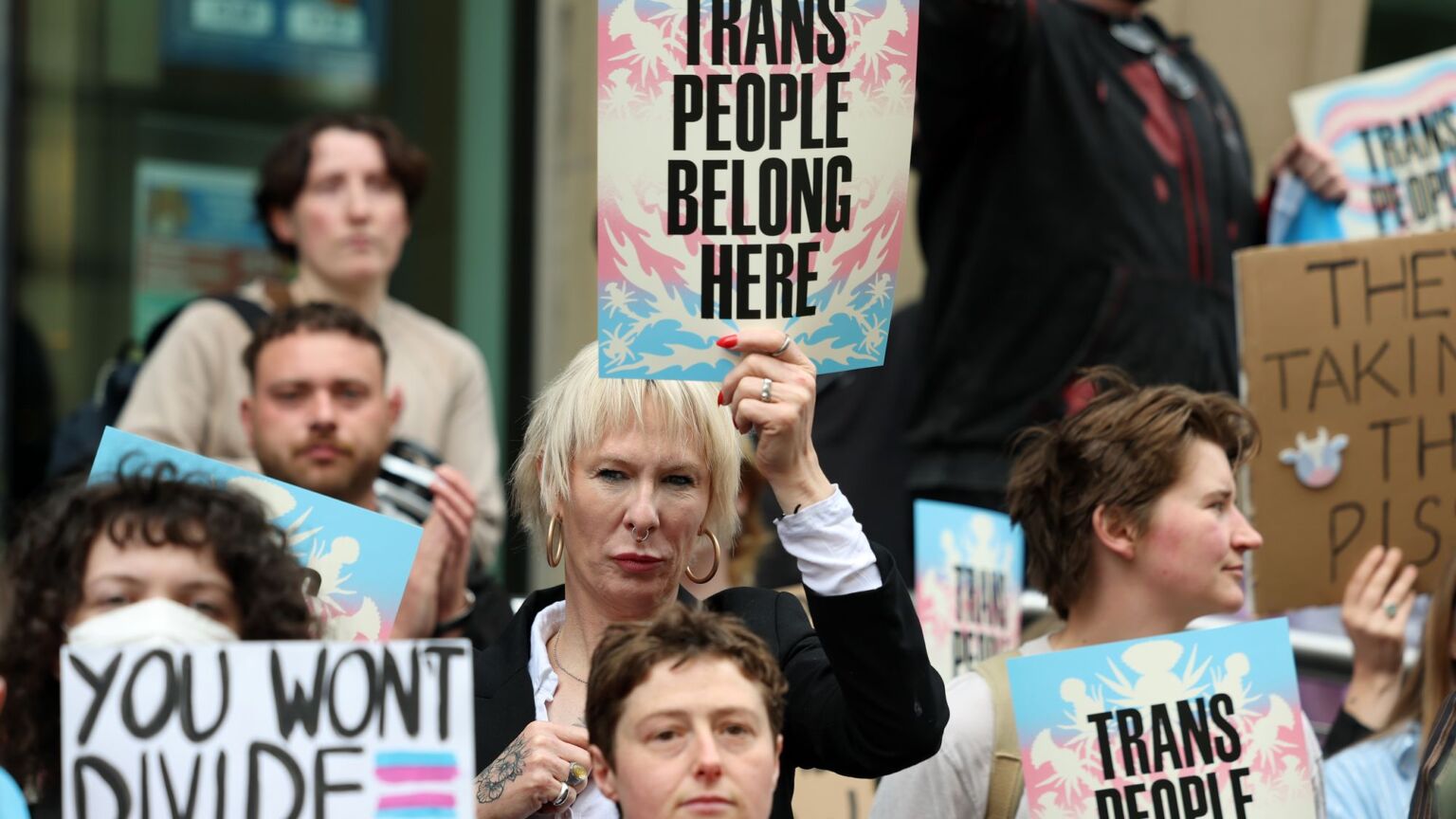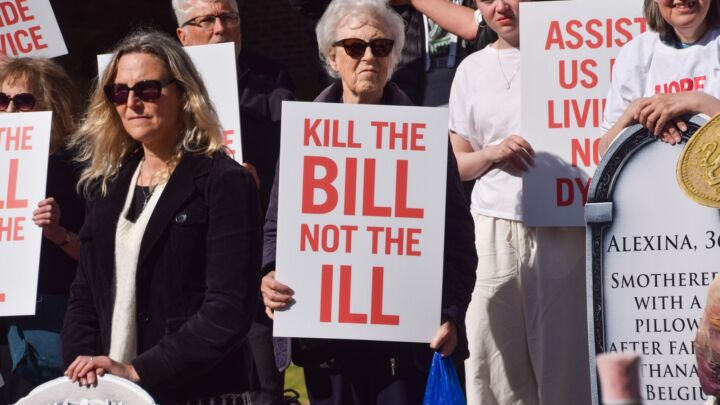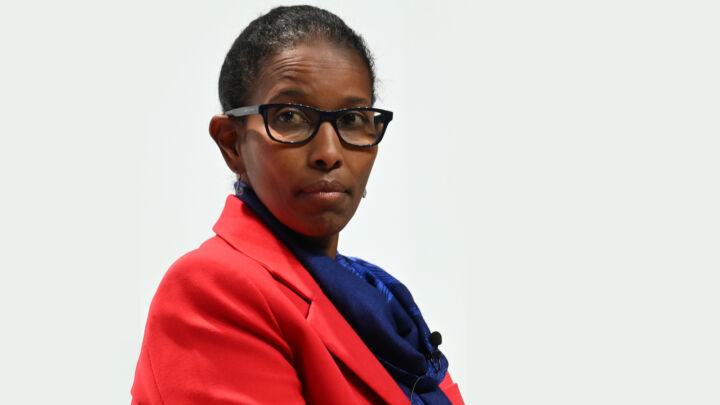Men are still being let into women’s spaces
Schools, hospitals and domestic-abuse shelters are defying the Supreme Court and trashing women’s rights.

Want unlimited, ad-free access? Become a spiked supporter.
When the UK Supreme Court ruled last month that a woman is defined as a biological female in equality law, you might have thought that the mad business of letting men into women’s spaces would finally be over. Yet the list of institutions and organisations planning to defy the ruling is growing longer by the day.
This week, the Houses of Parliament announced that they will not stop biological men from entering the women’s toilets. A spokesman for the House of Commons told the Telegraph it is waiting for guidance from the Equality and Human Rights Commission (EHRC) before it changes its rules. In the meantime, it wants to ensure that everyone is treated in an ‘inclusive manner’ – which is trans-activist lingo for letting men pee freely in the ladies. (The Lords is expected to follow the Commons.) This is despite the fact that the EHRC has already released interim guidance, which states clearly and unequivocally that biological men ‘should not be permitted to use the women’s facilities’.
Unison, Britain’s biggest trade union, also intends to ignore the law. It emerged last weekend that Ellie Waple, a biological male, is running for a seat on the Unison national executive committee that is supposed to be reserved for a member who is female and disabled. Unison’s defiance of the judgement is especially brazen. After all, the case the Supreme Court was considering, For Women Scotland Ltd vs The Scottish Ministers, was brought in response to the Scottish government allowing men with gender-recognition certificates to occupy positions reserved for women on public boards. The judgement was clear: women in this context means biological females, not male-bodied ‘transwomen’.
Unison is not alone. The UK’s largest teaching union, the National Education Union (NEU), voted earlier this month to continue to allow trans teachers to use female facilities in schools, including women’s bathrooms and girls’ changing rooms. The motion, titled ‘trans rights are human rights’, also claims that the Supreme Court ruling ‘contradicts human rights and dignity of trans and other gender-diverse staff and encourages discrimination, harassment and hate crimes’.
It is telling that the NEU sees the simple statement of biological fact as encouraging ‘discrimination, harassment and hate crimes’. Predictably, no thoughts are spared for the female teachers who might feel threatened by the presence of men in their bathrooms or, worse still, young girls who might have to share their changing rooms with adult male teachers.
Just as worrying is the news that several NHS trusts are also planning to continue operating on the basis of gender self-identification. Last month, the Telegraph reported that hospital bosses are vowing to allow men to keep using the women’s facilities – including female-only wards and toilets. Guy’s and St Thomas’s Hospital NHS Foundation Trust in London told its staff via an internal memo that it would ‘reaffirm the trust’s unwavering commitment to supporting people of all gender identities and gender expression’. While it emphasised that the trust would follow with updated guidance soon, it seems almost certain that it will come down on the side of so-called trans inclusion. Similarly, Leeds Teaching Hospitals NHS Trust told staff that it is ‘really important to clearly say that [the Supreme Court] ruling doesn’t change the fact that everyone is welcome’. Except it does, of course. Obviously, everyone is welcome in an NHS hospital, but men are not welcome in women-only wards. This is not a difficult concept to grasp or a difficult policy to implement.
Even the British Medical Association – which you might hope would have a strong grasp on the facts of biology – has distanced itself from the Supreme Court’s ruling, calling it ‘biologically nonsensical’ and ‘scientifically illiterate’. Apparently, the idea that men and women are different sexes ‘has no basis in science or medicine, while being actively harmful to transgender and gender-diverse people’, which will be news to any scientists who haven’t drunk the trans Kool-Aid. (The BMA has form on this, too. It was the only major medical organisation in the UK to reject the findings of the Cass Review last year and to call for the ban on puberty blockers to be reversed.)
Worse still, some domestic-violence shelters appear set to go against the Supreme Court ruling. At least five charities that operate using ‘an inclusive definition of women’ – that is to say, where men are welcome in their shelters – have released statements saying they will not change their policies.
In many ways, this intransigence was all too predictable. Our institutions have long been captured by trans ideology and were unlikely to start seeing sense overnight following a single court judgement. Nevertheless, it is both depressing and outrageous that places where single-sex spaces are clearly most necessary – including schools, hospitals, even domestic-violence shelters – are still subordinating women’s safety, privacy and wellbeing to the delusions of a handful of men.
This is serious. As Helen Joyce pointed out on BBC Radio 4’s Woman’s Hour last week, any man who continues to enter women’s spaces following the ruling is now harassing women who simply want to go about their business. Worse still, those organisations that refuse to accept the Supreme Court’s decision will actually be facilitating that harassment.
Clearly, the Supreme Court ruling on what a woman is was just the first hurdle in the battle for single-sex spaces. A long, difficult road lies ahead before women’s rights are fully secured – and men are kept out of women’s spaces for good.
Lauren Smith is a staff writer at spiked.
£1 a month for 3 months
You’ve hit your monthly free article limit.
Support spiked and get unlimited access.
Support spiked – £1 a month for 3 months
spiked is funded by readers like you. Only 0.1% of regular readers currently support us. If just 1% did, we could grow our team and step up the fight for free speech and democracy.
Become a spiked supporter and enjoy unlimited, ad-free access, bonus content and exclusive events – while helping to keep independent journalism alive.
———————————————————————————————————————————–
Exclusive January offer: join today for £1 a month for 3 months. Then £5 a month, cancel anytime.
———————————————————————————————————————————–
Monthly support makes the biggest difference. Thank you.










Comments
Want to join the conversation?
Only spiked supporters and patrons, who donate regularly to us, can comment on our articles.